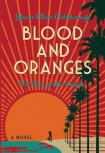Blood and Oranges, James Goldsborough [spicy books to read txt] 📗

- Author: James Goldsborough
Book online «Blood and Oranges, James Goldsborough [spicy books to read txt] 📗». Author James Goldsborough
Circular rather than traditionally rectangular, with a mammoth stage and amphitheater, the Temple of the Angels took two years to build and when completed was topped by a 100-foot-high golden dome in place of a steeple. The interior was cloaked in heavy burgundy curtains, with three tiers reaching to the base of the dome. Soldiers seated on the higher tiers looked down on the stream feeding the baptismal pool as if viewing from heaven itself. The exterior was made of white stone speckled with crushed seashells to provide sparkle, visible for miles around. Parishioners climbed into the foothills of the San Gabriel Mountains to look down on their temple, glittering like thousands of diamonds in the sunlight.
Five thousand Soldiers came for the opening Sunday service and five thousand more for the first evening show. Willie was preaching not just to them but to tens of thousands listening on his own radio station, KWEM, beaming its signal from two tall antennas on the roof below the golden dome. It was the evening show, not the morning services, he’d chosen to broadcast, for radio, still in its infancy, had discovered that broadcast waves at night, unlike during the day, bounced off the ionosphere and traveled to far distant points. From there, relay stations were beaming them in every direction, soon turning tens of thousands of Los Angeles listeners into millions across the nation.
“Radio,” Willie proclaimed that first night on the air, “used in the right way, is a beautiful priceless gift from the loving hand of our Father God.”
At home that night, ashamed of his hypocrisy, sobbing by his bed in his West Hollywood bungalow, he confessed and prayed for penance. He turned to Augustine, opening the Confessions at random as Augustine had opened Paul’s Epistles. His eyes fell on the immortal words: “If not now, lord, when?”
Chapter 8
Angie l’Amoureux was from Beaumont, Texas, a Baptist girl who’d come to Los Angeles with her husband Gil, a derrick roughneck from the Louisiana swamps. There is plenty of oil around Beaumont, but Angie’s father, a Baptist preacher named Smallwood who’d married a Mexican dancer to save her from the saloons, didn’t approve of Gil and so the couple ran off where he couldn’t find them. Gil found a job in the gushing new wells of Santa Fe Springs, southeast of Los Angeles, where oil replaced the clear spring water citizens hoped would turn their little town into a world-famous spa. Oil paid better than water so no one complained, least of all Alphonzo Bell, the man who brought up the oil and got so rich he bought the place that would become Bel Air. Angie and Gil rented a three-room house in nearby Whittier, and Gil went off to work on the wells each day while Angie wondered what to do with herself.
She was twenty and pretty enough for Hollywood’s new film industry but so were a few hundred other girls. The successful ones were the lucky ones and sometimes they even had talent. The talent part didn’t matter a great deal because they stayed mostly in the background in the silent movies, usually as dancers or maybe just pretty faces in the crowd, but it was a better way to make a living than for the girls who weren’t “discovered.” The others looked for more conventional work, and in the days of telephone and elevator operators, typists, drug store counters, and Woolworth dime stores, they didn’t have to look far.
Gil didn’t take to marriage. A good-looking, hard-living, tough-talking Cajun, he was irresistible to women and so didn’t resist. He was twice Angie’s size, beat her up as a going-away present, and she threw her wedding ring at him on his way out the door. When she’d saved enough money for a lawyer she would file for divorce, which took time in California. Gil found a better job in Bakersfield, where the women in Oil City were more to his taste. It worked out for everyone. Angie moved to Glendale where she was more likely to be discovered than in Whittier and took a job at a soda fountain called Tony’s. Glendale advertised itself as the “Fastest Growing City in America”—fastest growing because, as a chamber of commerce brochure spelled out: “We have a strictly white population. There are not a half dozen [sic] other than Caucasians in the city.” It was the soda fountain’s proximity to her apartment house on Glendale Boulevard, not the city’s racial preferences that attracted Angie to the job.
Glendale was close enough to Echo Park that the Rev. Willie Mull could go there or to Pasadena or Burbank for lunch or a soda without wasting too much time or attracting too big a crowd. Broadcasts from the temple had made him famous, as famous, some said, as Douglas Fairbanks or Will Rogers. He enjoyed moving around the city on his own. Dressed in street clothes, hat and sunglasses, he could pass incognito. The temple had a Cadillac for official events and Willie had his own sporty Chevy Roadster, but he liked to slip out without a word, hop on a Pacific Electric Big Red Car and take it wherever it was headed, which from Echo Park was normally Glendale, Pasadena, or Burbank.
He met Angie on one of those hot, downtown summer days when the air comes off the desert instead of the ocean and you have trouble breathing from the moment you step outside. He went out looking for an ice cream sundae, and since there were no drugstores or soda parlors in Echo Park, he caught the first Big Red Car that came along, which happened to say Glendale. It might





Comments (0)